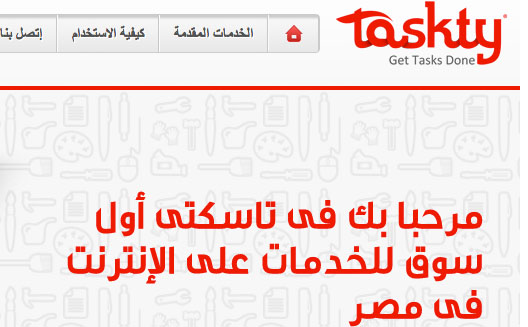Taskty Launches to Provide Services to Egyptian Startups and Customers


While creating platforms for freelancers and project-based jobs
has been a popular concept around the globe, now it's becoming one
of the hotter trends in the Arab world, as unemployment rises and
more students and women search for part-time and project-based
work.
Several platforms have launched in the past year to solve the
problem: Jordan has tasmeemME, Dubai has Nabbesh, and now Egypt has Taskty (meaning "my task"), a platform
that connects users to providers and contractors to fulfill small
tasks and requests.
Taskty, a recent
graduate from Flat6Labs, was founded by a team of six,
including leader Ahmad Jalal, who, after graduating from the
Faculty of Dentistry, turned to online business and has been
working for the last 10 years to develop, market, and manage
websites.
The idea sprang from his own difficulties finding talented, consistent service providers who could perform short-term tasks- a common complaint among startups in the Arab world. "In many cases, I discovered that the person I was working with was not sufficiently competent, after I had wasted a lot of time, money and effort," he explains.
To address the talent gap, Taskty now helps clients find providers who can perform translation, graphic design, simple legal consultations, data entry, as well as maintenance and household cleaning services. To guarantee quality, the startup holds service providers to strict criteria, and offers an online feedback system to help clients hold them accountable.

Obstacles and Challenges
It may be a tricky business, but there's no time like the present for an online marketplace like Taskty, says Jalal, especially after several companies in Egypt have been forced to lay off skilled and experienced employees due to economic instability in the wake of the revolution. New small businesses, on the other hand, need freelance workers for jobs that they can't afford to hire fulltime staff for.
The company still faces two
major challenges. First, providing a payment gateway is difficult
in a climate with low credit card penetration like Egypt. To serve
its clients conveniently, Taskty now is collecting bills from
home.
Another major challenge is providing clients with a sense of direct
and personal contact with employees, to reassure them about
quality. To address this issue, "we're keen on providing clear
phone numbers on all the website pages and all advertising forms
that we use, to make the client feel that we are always ready to
resolve any issue they might face,” Jalal says.
A Look into the Future
While the site officially launched only days ago, the Taskty team seems optimistic about the near future. It's still early to assess its potential success, but the founders say that around 30% of visitors have already registered on the site, and began requesting services on the first day.
Regarding their plans for the near future, Jalal said the platform will soon target a larger number of customers, by marketing, and offering more methods for requesting services, such as a call center. The website is also working on a smartphone app. "This strong infrastructure will enable us to expand to major cities in Egypt and then to the Arab Gulf and the entire Arab region," he says optimistically.
It is remarkable to see the explosion of companies that provide everyday tasks services in Egypt, like Mashaweer, which also provides clients with daily tasks on-the-go. The question remains, which method will the Egyptian society prefer; which will meet its demands more effectively?


